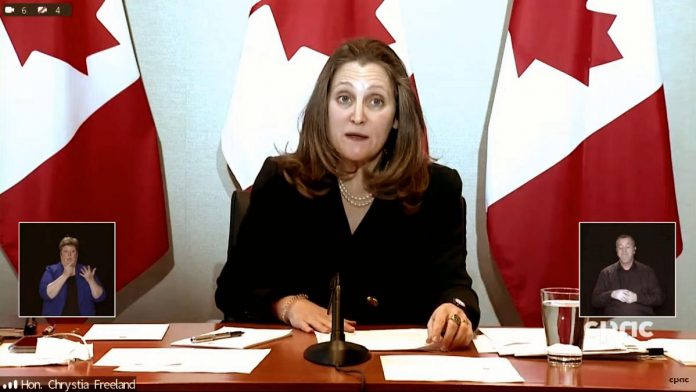
On Wednesday (December 22), the federal government announced it is expanding eligibility for COVID-19 support programs to include businesses and workers affected by capacity limits arising from the spread of the omicron variant. Prior to the federal announcement, the Ontario government announced a new property tax and energy rebate program for businesses along with a six-month deferral period for most provincial taxes.
The federal government is temporarily expanding its definition of a lockdown to include public health orders in provinces and territories that reduce capacity limits by at least 50 per cent. Previously, the definition only included public health orders that required a business to close its doors to the public for at least two weeks.
“Today, through regulatory authorities that were approved with the passage of Bill C-2, we are announcing our decision to temporarily expand the definition of a lockdown, so that these wage and rent support programs can support workers and businesses that see capacity restricted by 50 per cent or more,” said federal finance minister Chrystia Freeland during a virtual media conference on Wednesday afternoon.
The expanded definition, which includes provincial and territorial orders involving capacity restrictions of 50 per cent or more, is retroactive to December 19 and also reduces the minimum number of days a lockdown order needs to be in place to meet the new definition from 14 consecutive days to seven consecutive days.
Under the new definition, the Local Lockdown Program will include employers subject to capacity-limiting restrictions of 50 per cent or more, and the current-month revenue decline threshold requirement will be reduced to 25 per cent. Eligible employers will receive wage and rent subsidies from 25 per cent up to 75 per cent, depending on how much revenue they have lost loss.
“If you are an employer who has to reduce the capacity of your main business by 50 per cent or more, you will be eligible for wage and rent subsidy support through the Local Lockdown Program,” Freeland said. “Your organization only needs to demonstrate revenue loss during the current month, compared with 2019. Employers will be able to apply for these expanded support programs after the end of each program period, in exactly the same way that they received wage and rent subsidy support when those programs were launched last year.”
For workers, the expanded definition means the Canada Worker Lockdown Benefit will include workers in regions where provincial or territorial governments have introduced capacity-limiting restrictions of 50 per cent or more.
“This benefit will put $300 a week in your pocket to supplement your lost wages,” Freeland said.
The Canada Worker Lockdown Benefit is available to workers who have lost 50 per cent or more of their income, including workers who are ineligible for Employment Insurance (EI) as well as those who are eligible for EI, as long as they are not paid benefits through EI for the same period.
Both the Local Lockdown Program and the Canada Worker Lockdown Benefit are available retroactively from October 24 to May 7, 2022, although the expanded lockdown definition is only retroactive to December 19.
The expanded lockdown definition will remain in place until February 12, after which it will revert to the original definition of a lockdown to mean the closure of non-essential commercial activities or services for at least 14 consecutive days.
“Public companies receiving the wage subsidy through these support programs that increase their top executive compensation in 2022 compared to 2019 will have this wage subsidy support clawed back,” Freeland added. “These companies will also become ineligible if they pay dividends while receiving the wage subsidy.”
Prior to the federal announcement, the Ontario government announced a new Ontario Business Costs Rebate Program and a six-month interest- and penalty-free period to make payments for most provincially administered taxes.
Through the new Ontario Business Costs Rebate Program, eligible businesses will receive rebate payments equivalent to 50 per cent of the property tax and energy costs they incur while subject to the current capacity limits. Examples of eligible businesses include restaurants, smaller retail stores, and gyms.
A full list of eligible business types will be made available in mid-January 2022, when online applications for the program will open. Payments to eligible businesses will be provided retroactive to December 19. Businesses will be required to submit property tax and energy bills as part of the application process.
The province is providing an optional six-month interest- and penalty-free period for businesses to make payments for most provincially administered taxes, including the employer health tax, taxes on beer, wine, and spirits, tobacco tax, insurance premium tax, fuel tax, international fuel tax agreement, gas tax, retail sales tax on insurance contracts and benefit plans, mining tax, and race tracks tax.
The six-month period will begin on January 1 and end on July 1, 2022.


























